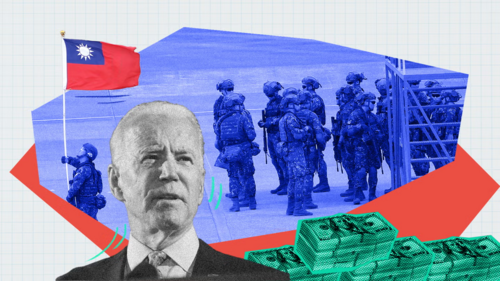Why is the United States Arming Taiwan?

The U.S. has maintained a delicate balance between not officially recognizing Taiwan as a sovereign nation and arming the island to fend off any Chinese aggression.
In short: In August, President Joe Biden approved $80 million for Taiwan to buy U.S. military equipment, marking the first time in four decades that “America is using its own money to send weapons to a place it officially doesn't recognise,” according to the BBC. China is against the funding – for decades it has maintained that Taiwan, a self-governing island, is part of China. The U.S. has maintained a delicate balance between not officially recognizing Taiwan as a sovereign nation and arming the island to fend off any Chinese aggression. The U.S. is concerned that an expanding China could threaten its own political and economic interests in the Asia-Pacific region.
Why does China say Taiwan is a part of the PRC?
Before and during World War II, the Chinese Communist Party (CCP) led by Mao Zedong, and the Nationalist Party (KMT), led by Chiang Kai-shek, were fighting for control of China. The U.S. backed the KMT but eventually stopped giving it military aid, and in 1949 Mao “announced the establishment of the People’s Republic of China (PRC).” Chiang fled to Taiwan, “bringing two million KMT troops and supporters with him,” and declaring Taipei “the temporary capital of the Republic of China.”
For two decades after 1949, international actors, including the U.S. and the U.N., considered Taiwan to be the PRC. But in 1971, the U.N. voted “to admit the People’s Republic of China (mainland China) and to expel the Republic of China (Taiwan).” In 1979, the U.S. changed its “diplomatic recognition” from Taiwan to mainland China.
China sees Taiwan, which has been self-ruled for nearly 75 years and a democracy since 1996, as a “breakaway province that will eventually be under Beijing’s control.”
Taiwan’s defense minister, Chiu Kuo-cheng, said in February that China has been ramping up its efforts to control Taiwan following Russia’s invasion of Ukraine in February 2022.
What is the U.S.’ relationship with Taiwan?
According to the U.S. State Department, “Though the United States does not have diplomatic relations with Taiwan, we have a robust unofficial relationship.” In 1979, the U.S. established the Taiwan Relations Act, which requires the U.S. to “provide Taiwan with arms of a defensive character,” and to “maintain the capacity of the United States to resist any resort to force or other forms of coercion that would jeopardize the security, or the social or economic system, of the people on Taiwan.”
In July, President Biden announced a $345 million arms package for Taiwan. The equipment was directly transferred from the Pentagon to Taiwan – the first time this type of transfer has occurred between Taiwan and the U.S.
Tensions between Taiwan and China in the South China Sea – an area between China and Taiwan – have increased since the beginning of the year. In April, China performed “large-scale combat exercises around Taiwan” that included a simulated blockade. And in October, the U.S. and the Philippines finished military exercises in the South China Sea.
In February, the U.S. and the Philippines struck a deal that allows U.S. forces access to four additional military camps in the Philippines; two of these are near Taiwan, giving the U.S. access to a total of nine military camps. Philippine President Ferdinand Marcos Jr. said he told China that the military bases available to the U.S. military wouldn’t be used for any “offensive action,” only to aid the Philippines.
Taiwan and the U.S. also have a strong economic relationship. “Taiwan is the United States’ eighth-largest trading partner, and the United States is Taiwan’s second-largest trading partner,” according to the State Department.
Why does the U.S. care so much about Taiwan?
Taiwan matters to the U.S. for both political and economic reasons.
In 2020, Taiwan invested almost $137 billion in the U.S. while the U.S. invested $31.5 billion in Taiwan the same year.
Taiwan is also a key manufacturer of semiconductors and computer chips. It produces so many of them that if it stops “no other company will be able to fill the gap in the short term,” according to the Council on Foreign Relations.
It’s also important to keep Taiwan a functioning democracy because it “helps keep peace and stability in the world,” political scientist Lev Nachman told NBC News.
Taiwan is among a string of islands, including Japan and the Philippines, that are allied with the U.S. This makes Taiwan essential to ensuring the security of the region and U.S. interests, like capping China’s power and maintaining an “asymmetric advantage” over China, the CFR stated.
If China can’t control Taiwan in a region with U.S. allies, “China’s military will struggle to project power far beyond China’s shores,” the CFR wrote. But if China were able to take Taiwan, “it would be far more difficult for the United States to maintain a balance of power in the Indo-Pacific or prevent a Chinese bid for regional dominance.”
Building up Taiwan’s arms to stave off any Chinese military action also prevents a costly conflict that would lead to thousands of deaths and risk global financial harm, Assistant Secretary of Defense for Indo-Pacific Security Affairs Ely Ratner told the House Armed Services Committee in September.

